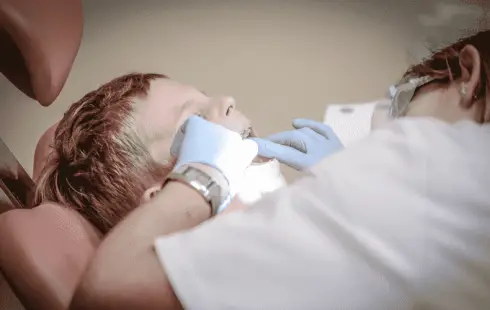
Fully Funded Scholarship Opportunity at the Bavarian International School for 2026-27
Section: News
 Good oral health is not just about having a bright smile; it's also essential for overall well-being. Yet, dental care often takes a back seat in many people's health routines, leading to a range of oral health issues that can impact quality of life. In this article, we delve into the importance of dental care and explore strategies for maintaining healthy smiles.
Good oral health is not just about having a bright smile; it's also essential for overall well-being. Yet, dental care often takes a back seat in many people's health routines, leading to a range of oral health issues that can impact quality of life. In this article, we delve into the importance of dental care and explore strategies for maintaining healthy smiles.
The Link Between Oral Health and Overall Well-Being
The mouth serves as a gateway to the body, and the health of our teeth and gums can have far-reaching effects on our overall health. Poor oral health has been linked to various systemic conditions, including heart disease, diabetes, and respiratory infections. Additionally, untreated dental problems can cause pain, discomfort, and difficulty eating, impacting an individual's quality of life and well-being.
Regular dental check-ups are essential for early detection and prevention of oral health issues. During these appointments, dentists can identify signs of decay, gum disease, and other dental problems, allowing for prompt intervention and treatment. Moreover, routine cleanings and preventive measures, such as fluoride treatments and sealants, can help maintain optimal oral health and prevent future issues.
Promoting Oral Health from Childhood to Adulthood
Establishing good oral hygiene habits early in life is key to promoting lifelong oral health. Parents play a crucial role in teaching children proper brushing and flossing techniques and instilling the importance of regular dental visits. Early exposure to preventive dental care can help children develop positive associations with oral health and reduce the likelihood of dental anxiety in adulthood.
As individuals transition into adolescence and adulthood, maintaining consistent oral hygiene practices becomes paramount. This includes brushing teeth twice daily with fluoride toothpaste, flossing daily, and using mouthwash to reduce bacteria and prevent plaque buildup. Additionally, limiting sugary foods and beverages, quitting smoking, and avoiding excessive alcohol consumption can further support oral health and overall well-being.
Addressing Common Oral Health Concerns
Despite the importance of dental care, many individuals still face common oral health issues that can impact their smiles and quality of life. Tooth decay, gum disease, and oral cancer are among the most prevalent dental concerns, highlighting the need for regular dental check-ups and preventive care.
Tooth decay, caused by bacteria in the mouth converting sugars into acids that erode tooth enamel, is a leading cause of cavities and dental pain. Early intervention through dental fillings and sealants can help prevent further decay and preserve the integrity of the tooth.
Gum disease, characterized by inflammation and infection of the gums, can lead to gum recession, tooth loss, and systemic health problems if left untreated. Routine dental cleanings and proper oral hygiene practices are essential for preventing and managing gum disease.
Oral cancer, while less common, can have serious consequences if not detected and treated early. Dentists play a vital role in screening for oral cancer during routine dental exams, allowing for prompt diagnosis and intervention if necessary.
Access to Dental Care: Overcoming Barriers to Oral Health
Despite the importance of dental care, access to dental services remains a challenge for many individuals, particularly those from underserved communities. Cost, lack of insurance coverage, and geographic barriers can hinder individuals' ability to seek regular dental care, leading to disparities in oral health outcomes.
Efforts to improve access to dental care, such as community dental clinics, mobile dental units, and teledentistry services, are crucial for addressing these disparities and ensuring that everyone has access to quality oral health care. Additionally, advocacy for policies that expand dental insurance coverage and incentivize dental professionals to serve underserved communities can help bridge the gap in access to care.
Prioritizing Oral Health for Overall Well-Being
In conclusion, dental care is an integral component of overall health and well-being. From childhood to adulthood, maintaining good oral hygiene practices and seeking regular dental check-ups are essential for preventing oral health issues and addressing common concerns. By prioritizing oral health and promoting access to dental care for all, we can ensure that everyone has the opportunity to enjoy healthy smiles and optimal well-being.
Image by Michal Jarmoluk from Pixabay

Section: News

Section: Arts

Section: Travel

Section: Arts

Section: Arts

Section: Arts

Section: Fashion

Section: Politics

Section: Fashion

Section: News
Both private Health Insurance in Germany and public insurance, is often complicated to navigate, not to mention expensive. As an expat, you are required to navigate this landscape within weeks of arriving, so check our FAQ on PKV. For our guide on resources and access to agents who can give you a competitive quote, try our PKV Cost comparison tool.
Germany is famous for its medical expertise and extensive number of hospitals and clinics. See this comprehensive directory of hospitals and clinics across the country, complete with links to their websites, addresses, contact info, and specializations/services.
Join us at the Kunstraum in der Au for the exhibition titled ,,Ereignis: Erzählung" by Christoph Scheuerecker, focusing on the captivating world of bees. This exhibition invites visitors to explore the intricate relationship between bees and their environment through various artistic expressions,...



No comments yet. Be the first to comment!